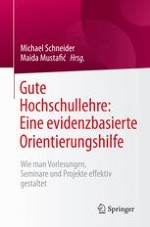2015 | OriginalPaper | Chapter
6. Prüfung
Authors : Susanne Bücker, Meike Deimling, Janina Durduman, Julia Holzhäuser, Sophie Schnieders, Maria Tietze, Sharmina Sayeed, Michael Schneider
Published in: Gute Hochschullehre: Eine evidenzbasierte Orientierungshilfe
Publisher: Springer Berlin Heidelberg
Activate our intelligent search to find suitable subject content or patents.
Select sections of text to find matching patents with Artificial Intelligence. powered by
Select sections of text to find additional relevant content using AI-assisted search. powered by
